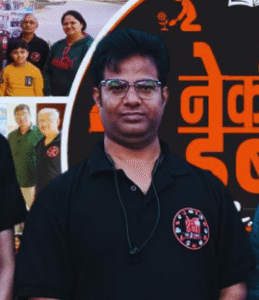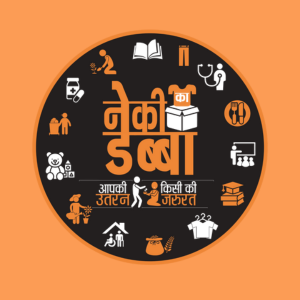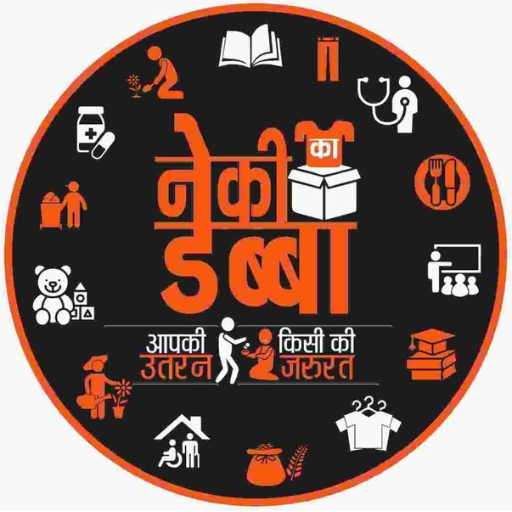Meet the Founder
Girish Chandra Shukla
The man behind the movement that has touched countless lives

“The Neki Ka Dabba is not a person; it is an idea… and this idea is the source of my life’s energy.”
What began as a spark—a few clothes stored in a corner—has grown into a transformative movement. More than just donating clothes, The Neki Ka Dabba restores dignity, kindles hope, and gives wings to dreams.
Each morning, I recall Swami Vivekananda’s words:
“If you wish to serve God, first serve humanity.”
To me, The Neki Ka Dabba is that service. It is my offering to God and to society. Our vision was clear from the beginning: What is useless to one could be life-changing for another.
During the 2020 pandemic, when the world stood still, uncertainty and despair loomed large. Streets were empty, hearts were heavy, and hope was hard to find. Amid that silence, one question kept echoing in my heart:
“If not now, then when?”
And so, The Neki Ka Dabba Foundation took its first step—with a few essentials and a heart full of intent. We began placing small “dabbas” of Neki Ka Dabba in public places for anyone in need. Doubts were many—would anyone notice? Would it matter? But slowly, like ripples in water, compassion began to spread.
Strangers became supporters. Volunteers stepped forward. What began as a single act became a collective movement.
Today, The Neki Ka Dabba is not just a foundation. It’s a reflection of humanity at its best. From distributing clothes, food, and medicines to leading educational drives and environmental initiatives, every project is driven by one belief:
“Kindness is never wasted.”
I never began with a grand plan. I started with a simple purpose—to ensure no one around me goes to bed hungry, suffers in silence, or feels forgotten.
This story isn’t just mine. It’s yours too. It belongs to everyone who believes a small act of kindness can change the world.
More Than Charity—A Movement for Change
The Neki Ka Dabba is not merely about donations; it’s about rebuilding society’s foundation.
It’s the spark in the eyes of a child who didn’t know the way to school.
It’s the hope of a mother who couldn’t afford medicine.
It’s the confidence of a youth holding a book for the first time.
Our educational initiative doesn’t just hand out freebies. Instead, it teaches dignity through effort. When children in torn shoes came to our Pathshala, we told them:
“Learn the multiplication table of twelve, and you’ll earn shoes or clothes.”
What they earned wasn’t just an item—it was pride. That’s the real power of education: it doesn’t just give answers; it builds self-worth.
Redefining Celebrations with Compassion
With The Neki Ka Dona-Pattal, birthdays now mean feeding the hungry.
Memorials are no longer feasts—but acts of compassion in forgotten homes.
One cold morning, a father stood in a hospital corridor, clutching his sick four-month-old child. His words still echo in my heart:
“Even if I sell myself, I cannot afford treatment.”
That moment gave birth to our Neki Ki Dawa initiative. Our team took full responsibility—medicines, care, and prayers. Days later, that child survived. That wasn’t just a life saved—it was a mission born.
Kindness is Contagious—And We Call It a Revolution
The Neki Ka Dabba is more than an organization. It’s a passion. An ideology.
A revolution beyond caste, religion, or class—it recognizes only sewa (service).
Today, our nine major initiatives touch every part of society—education, environment, blood donation, cow care, medicines, books, and more.
One day, my little daughter asked:
“Daddy, when will you take us to the zoo?”
I thought, why not take her to something even more magical?
I brought my family to The Neki Ki Pathshala. As my children saw the joy in teaching, they said:
“Daddy, forget the zoo. Let’s go teach again!”
My wife and children have now joined me completely. Their love, trust, and belief in this mission are my greatest strengths.
A Personal Mission, A Shared Dream
Every morning, I rise with a dream in my heart—a dream not just mine, but ours.
After my father’s passing, something felt incomplete.
But today, in every smile of a person helped, I feel his blessing.
The Neki Ka Dabba is my tribute to him.
My rebirth.
And my resolve:
As long as I live, kindness will endure.
Our volunteers? They are crazy.
Crazy about kindness.
They work tirelessly, expecting nothing in return.
They are our real wealth.
This is not just a story.
It is a revolution.
It is a movement to hold every needy hand and whisper:
“You are not alone. Kindness still lives.”
If you too believe in this dream,
The Neki Ka Dabba awaits you.


